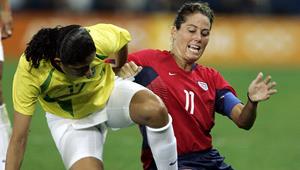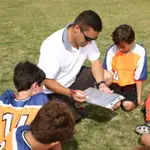Just moments ago you were shouting, "Go, Jackson, go" from the sidelines of the soccer field. Your 5-year-old, swimming in mesh shorts and a cotton T-shirt, shin guards up to his thighs, was running to the ball. He swung his foot back and made contact with those tiny cleats that required a special trip to the sporting goods store. He dribbled for a few feet before a teammate got the ball and started kicking in the wrong direction.
"That way," the coach directs, pointing to the goal.
"That way," other parents yell.
As for you, you start asking, "What are you doing?"
There, where your kid lost possession of the ball, is a shower of grass. A tiny body, hot and tired, is sitting while picking at the field and tossing the blades into the air.
You stop and shake your head. This was not how you imagined your future World Cup champion kicking off his career.
But before you cross his name off the roster, here's what you’ll need to get through that first game—and season.
Adjust Expectations
When children are first starting sports, they get the basics—and only the very basics. Get to ball. Kick ball. Kick ball into goal. Things like strategy and team play come later (sometimes much later, depending on the child). Be patient and enjoy the other things your kid is learning, like following directions and sportsmanship.
Well-Nourished
The benefits of hydration and fueling are stressed when adults work out, but it should be for kids, too. If you want your kid to have fun and play to the best of their ability, they need to have a good snack before and access to water or a low-sugar sports drink during the game. Make sure to get a good mix of protein, carbohydrates and fat.
Make Friends
There's a moment in every parent's life when they realizes that if their child is supposed to be social, they should be, too. Sitting back and sipping an iced coffee as your kid runs around might seem like a chance to enjoy a glorious hour of relaxation to yourself, but a simple “hello” to the fellow parents can go a long way in helping you enjoy your child's time on the field. Plus, it might help you make some connections so your child can work on their game off the field.
Let Your Child Take the Lead
Being involved in team sports should be fun for you and your child. If they want to sit in the grass, try to understand why instead of scolding them or scooping them off the field. If they don't want to go to practice and can tell you why, maybe take a night off or explore another sport. And, if they want to go for a second season, look for opportunities to continue. You never know—Team USA might have a spot in 2030.
 Find activities for kids near you.
Find activities for kids near you.








Discuss This Article